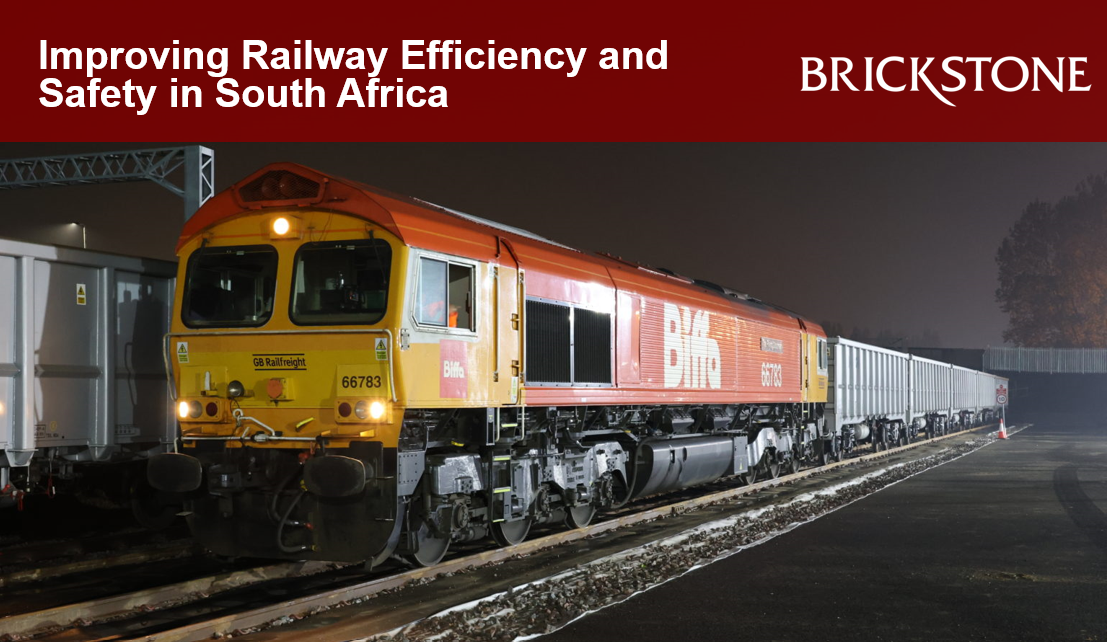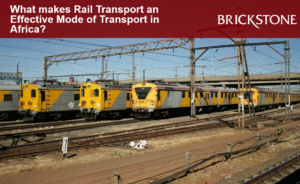Improving Railway Transport Efficiency and Safety in South Africa
Railway transport in South Africa plays an important role in the country’s transport infrastructure as major cities are connected by rail. This sector has not only largely contributed to the country’s economic development, but has also helped maintain a dominant role in transporting freight and passengers at low costs.
However, rail transport infrastructure in South Africa remains underdeveloped but still has great ambitions and potential. For South Africa to meet sustainable development goals of greener cities and communities, there’s the need to improve the country’s railway efficiency and safety. According to ITWEB, improving railway efficiency and safety in SA could reduce emissions, fossil fuel consumption in transport, and have broader social and economic benefits.
This article by Brickstone reviews some institutional reports and publications on improving railway efficiency and safety in South Africa, highlighting key facts and insights.
Electrified Rail Transport in improving SA’s Railway Transport
According to Electric & Hybrid, South Africa’s under-developed railway infrastructure can use best practice from more developed regions to become one of the most modern networks in the world, according to industry experts.
To present better opportunities for railway transport generally in Africa, there’s been a a great revolution for a rapid railway, equipped with the latest technologies, a standard gauge railway with a hybrid traction, diesel and electric.
As one of the most lowest emitting modes of transport – as well as one of the most efficient when it comes to greenhouse reducing gasses (GHG) and air pollution – electrified rail transport holds the potential for meeting the sustainable development goals of greener cities and communities, not to mention being an affordable and eco-friendly mode of transportation mode.
A recent report: “The Future of Rail Opportunities for Energy and the Environment”, released by the International Energy Association, showed the following key findings:
- Rail transport accounted for 2% of transport energy use, yet carried 8% of the world’s passengers and 7% of global goods.
- Around 0.3% of CO2 emissions from fossil fuels come from rail – compared to around 2% for global aviation. This could be improved as new and cleaner sources of power are introduced into the energy mix for rail.
- If all passengers and freight services that were carried by rail switched to road vehicles, such as cars and trucks, global oil demand for fossil-based fuels from transport would be higher by 16%.
- If all passengers and freight services that were carried by rail switched to road vehicles – such as cars and trucks – GHG emissions would increase by 12%.
According to ITWEB, these facts provide a clear indication of how South Africa’s rail infrastructure could be leveraged, not just to address the aforementioned sustainable development goals, but also contribute towards improving economic activity and job opportunities in the country.
The current rail network spans close to 23 000km, of which the Passenger Rail Agency of South Africa (PRASA) operates across 2 280km in terms of rail track span and 585 train stations with a total fleet of 4 735 coaches. In addition to this, PRASA makes use of TRANSNET’s 2 200km of rail track. This rail forms a strong base from which the environmental, economic and sustainability gains of rail transport can be exploited for good for the country.
However, the success of any initiative and programme aimed at increasing the use of rail as a mode of passenger and goods’ transport does rest on some critical factors –including rail safety, rail reliability and the level of rail operation efficiency that translates to more efficient input cost structures for rail operations (as well as competitive and affordable tariffs for commercial and passenger end-users).
It is with these objectives in mind that Macrocomm Group, a full service and multi-vertical IOT solutions provider, has announced a strategic joint venture with Bharat Rail Automation of India (BRAPL) – to deliver signaling management and smart railway management solutions to the railway sector (in the South African as well as other African markets).
As a new entity, Macrocomm-Bharat Rail Solutions will focus on delivering data-driven solutions that enable railway authorities to significantly improve operational efficiency and safety through contextual and secure signaling, as well as optimal route planning and scheduling. Macrocomm will leverage its IOT and data-driven capabilities together with BRAPL’s extensive experience and range of solutions in rail signaling, rail safety and route optimisation and scheduling to deliver safe, reliable and efficient rail transportation in South Africa.
Read more here.






